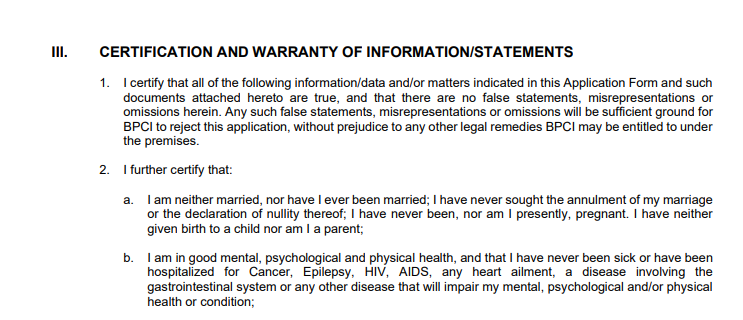
A national beauty pageant is being asked to change some of its qualifications for applicants after Pinoys noticed it does not allow those infected with the human immunodeficiency virus (HIV) to join.
Binibining Pilipinas recently opened its applications for aspiring beauty queens who want to join the 2023 edition last week.
The 59-year-old beauty pageant is responsible for crowning Filipinas who will represent the country in the following competitions —Miss International, Miss Intercontinental and Miss Globe.
Interested contestants-to-be need to accomplish a seven-page application form where they need to provide their personal and background information, as well as their reason/s for joining the pageant.
In the third part of the form, they are supposed to certify that the data they have given are genuine.
They must additionally certify that they have never been married and that they have a good moral character.
READ: Search is on: Bb. Pilipinas officially opens applications for 2023 contestants
Other conditions include the following:
I am in good mental, psychological and physical health, and that I have never been sick or have been hospitalized for Cancer, Epilepsy, HIV, AIDS, any heart ailment, a disease involving the gastrointestinal system or any other disease that will impair my mental, psychological and/or physical
health or condition;

This was noticed by some Pinoys who recalled that discrimination against perceived or actual HIV status is considered a violation under the Republic Act 11166 or the Philippine HIV and AIDS Policy Act.
RELATED: Advocates of new HIV-AIDS law hope to end stigma among Filipinos
The question about the pageant qualification was brought up by a Twitter user who was able to take a screenshot of some of the pageant’s conditions that were broadcast on television.
“This is against RA 11166. ‘Actual or perceived HIV status’ to discriminate against a person is a violation. Award!” another online user commented upon reading the clause.
Others called the national pageant’s attention and urged them to change their policies.
“Bb. Pilipinas should walk the talk and end discrimination against possible candidates who have HIV. The former Miss Universe
@PiaWurtzbach is a vocal advocate for persons living with HIV, for crying out loud,” a Pinoy wrote.
“Some of the queens in your pageant are actually fighting against the discrimination of PLHIVs [persons living with HIVs]. Do better, Binibining Pilipinas,” another Twitter user said.
“Hmm… previous BBP winners who went on to represent the country in Miss Universe advocated for HIV awareness. Bakit may discrimination sa qualifications saka anong kinalaman ng HIV status ng isang tao sa pagsali sa beauty pageant? Practice what [you] preach, @RealBbPilipinas,” a different user wrote.
As of this writing, Bb. Pilipinas has not yet issued a statement about the matter.
Some of its past contestants who have gone on to advocate for their cause on the global stage include Miss Universe 2015 Pia Wurtzbach, who famously championed HIV and AIDS awareness.
Pia had done two HIV tests in front of the cameras before to remove the stigma surrounding the condition.
The first was in 2016 at the Apicha Community Health Center in New York, while the second was in 2017 in the Philippines.
No to discrimination
The Philippine HIV and AIDS Policy Act prohibits the discrimination of individuals based on their perceived, suspected, or actual HIV status.
It defined discrimination in its implementing rules and regulations as the following:
“Unfair or unjust treatment that distinguishes, excludes, restricts, or shows preferences based on any ground such as sex, gender, age, sexual orientation, gender identity and expression, economic status, disability, ethnicity, and HIV status, whether actual or perceived, and all other similar or analogous cases, and which has the purpose or effect of nullifying or impairing the recognition, enjoyment or exercise by all persons similarly situated, or all rights and freedoms.”
The act also prohibited discrimination in workplaces, learning institutions, health institutions and hospitals and in instances related to travel, habitation and shelter.
Perceived, suspected or actual HIV status shall likewise not play any part in prohibiting a person from running for public office, denying them burial service, and excluding them from credit and insurance services.
Bullying in all forms and “other similar or analogous discriminatory acts” are additionally prohibited.
HIV s a virus that attacks cells that help the body fight infection, making a person more vulnerable to other infections and diseases.
It is transmitted by contact with certain bodily fluids of a person with HIV, most commonly during unprotected sex or by sharing needles, syringe,s or other drug injection equipment.
If left untreated, it can progress to AIDS or acquired immunodeficiency syndrome.
There is no effective cure for HIV, but it can be controlled by proper medical care.









